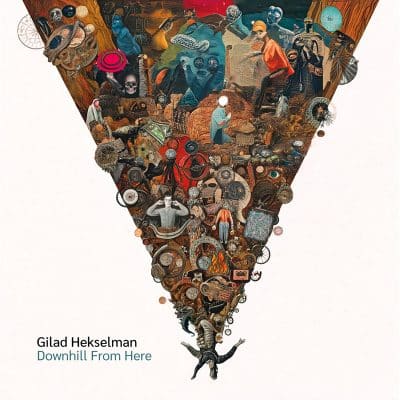Gilad Hekselman Downhill From Here
 Gilad Hekselman
Downhill From Here
la reserve
Perhaps the title references Israeli guitarist Gilad Hekselman’s Live at the Village Vanguard from last year (also on these pages) as the apex of his two decade career. Everything that follows is, in effect, downhill from that point. Yet, musicians don’t typically think that way. It’s more in line with critic speak. In any case, Hekselman returns with a top tier trio of Brad Mehldau’s longtime bassist Larry Grenadier (who appeared on the live date), and one of today’s most in-demand drummers, Marcus Gilmore, for a recording that attests as much to Hekselman’s songwriting as to his brilliant fretwork on Downhill From Here. Notably, we’ve heard Hekselman in a trio setting before on Trio Grande, along with saxophonist Will Vinson and drummer Antonio Sanchez. The more conventional trio with the guitarist as the lone melody instrument, provides for more lyricism and influences from ‘70s singer-songwriter fare as much as pure jazz.
The opening title track alternates short, crisp melodic bursts with shades of ‘70s psych-rock and even some traces of the free jazz explorations of the likes of John Abercrombie in the later ‘70s. Grenadier and Gilmore keep the motor running, the latter especially effective with cymbal flourishes to accent the guitarist’s chords. “Navadad” is reflective, featuring robust bass from Grenadier and light, resonating melodic tones from the guitarist as he steers through what is likely folkloric Hebrew. “Be Brave” begins rather calmly with focused interplay between the trio members but grows more intense through Hekselman’s molten liquid runs.
In a somewhat surprising turn, the trio renders a most gentle, lyrical reading of Burt Bacharach’s “Alfie.” “Wise Man” is more feisty and unpredictable, filled with short guitar bursts and continual rustling from Gilmore. Like the opener, this one has its fair share of free improvisations, with all trio members stretching out. Hekselman retreats into the gentle, rather atmospheric on “Seeing You” with ringing notes that resemble those of a piano in addition to his lush guitar notes. As with some of the others, this starts very calmly and gathers momentum as it evolves. In a standout track, he repurposes the bluesy “Scoville,” in tribute to one of his inspirations. The track also appeared on the Trio Grande album and forms a lively addition to this otherwise smoothly flowing material. That contrast is accentuated on the closing Hebrew folk song ’Like A Wildflower’ by Nachum Heiman (sung by Chava Alberstein in the 1970s), a rapturous piece.
Hekselman continues to show why he is one of the most revered guitarists on the scene, branching out a bit from simply jazz here to give us a deeper sense of his songwriting.
– Jim Hynes
Gilad Hekselman
Downhill From Here
la reserve
Perhaps the title references Israeli guitarist Gilad Hekselman’s Live at the Village Vanguard from last year (also on these pages) as the apex of his two decade career. Everything that follows is, in effect, downhill from that point. Yet, musicians don’t typically think that way. It’s more in line with critic speak. In any case, Hekselman returns with a top tier trio of Brad Mehldau’s longtime bassist Larry Grenadier (who appeared on the live date), and one of today’s most in-demand drummers, Marcus Gilmore, for a recording that attests as much to Hekselman’s songwriting as to his brilliant fretwork on Downhill From Here. Notably, we’ve heard Hekselman in a trio setting before on Trio Grande, along with saxophonist Will Vinson and drummer Antonio Sanchez. The more conventional trio with the guitarist as the lone melody instrument, provides for more lyricism and influences from ‘70s singer-songwriter fare as much as pure jazz.
The opening title track alternates short, crisp melodic bursts with shades of ‘70s psych-rock and even some traces of the free jazz explorations of the likes of John Abercrombie in the later ‘70s. Grenadier and Gilmore keep the motor running, the latter especially effective with cymbal flourishes to accent the guitarist’s chords. “Navadad” is reflective, featuring robust bass from Grenadier and light, resonating melodic tones from the guitarist as he steers through what is likely folkloric Hebrew. “Be Brave” begins rather calmly with focused interplay between the trio members but grows more intense through Hekselman’s molten liquid runs.
In a somewhat surprising turn, the trio renders a most gentle, lyrical reading of Burt Bacharach’s “Alfie.” “Wise Man” is more feisty and unpredictable, filled with short guitar bursts and continual rustling from Gilmore. Like the opener, this one has its fair share of free improvisations, with all trio members stretching out. Hekselman retreats into the gentle, rather atmospheric on “Seeing You” with ringing notes that resemble those of a piano in addition to his lush guitar notes. As with some of the others, this starts very calmly and gathers momentum as it evolves. In a standout track, he repurposes the bluesy “Scoville,” in tribute to one of his inspirations. The track also appeared on the Trio Grande album and forms a lively addition to this otherwise smoothly flowing material. That contrast is accentuated on the closing Hebrew folk song ’Like A Wildflower’ by Nachum Heiman (sung by Chava Alberstein in the 1970s), a rapturous piece.
Hekselman continues to show why he is one of the most revered guitarists on the scene, branching out a bit from simply jazz here to give us a deeper sense of his songwriting.
– Jim Hynes
Discover more from Making A Scene!
Subscribe to get the latest posts sent to your email.













































